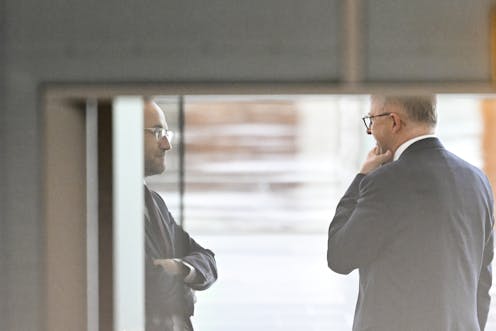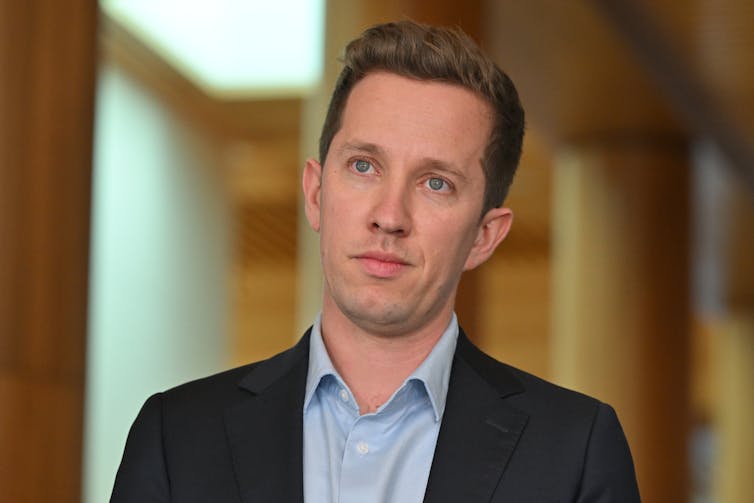Source: The Conversation (Au and NZ) – By Mark Kenny, Professor, Australian Studies Institute, Australian National University

Lukas Coch/AAP
Relations between a centrist Labor government feeling its way and an ascendant Greens party have become surprisingly strained of late.
The rancorous tone of public exchanges reveals deep-seated enmities born of an increasingly direct electoral contest in the inner cities, legitimate policy differences, and a hyper-sensitivity to criticisms made of each other.
A current flashpoint is Labor’s housing policy, or, as the Greens would describe it, Labor’s failure to square up to a full-blown rental affordability crisis.
Among its suite of policies, Labor proposes a Housing Australia Future Fund (HAFF), which would use the earnings only on $10 billion in capital (up to a cap of $500 million a year) to build 30,000 social and affordable homes over three years.
Labor’s bill to create the HAFF is currently before the parliament. But it faces a difficult future with the Greens flagging they will join with the Coalition in the Senate to vote it down, insisting it lacks ambition. This is essentially the same rationale the Greens relied on to justify defeating the Rudd government’s 2009 Carbon Pollution Reduction Scheme Bill, which they said at the time, “locks in failure”.
Labor is apoplectic. It accuses the smaller party of hypocrisy in claiming to speak for society’s most vulnerable while lining up with the conservatives to deliver no new social and affordable housing.
In parliament, Prime Minister Anthony Albanese has described the Greens’ calls for a nationwide rent freeze – incentivised by a $1 billion federal fund – and a five-fold increase in social housing expenditure as “absolute pixie dust”.
Foreign Minister Penny Wong, who is also government leader in the Senate, rounded on the minor party’s housing spokesperson, Max Chandler-Mather, claiming he was engaging in stunts to boost his profile.
Responding to Greens senator Nick McKim in the Senate on May 11, a furious Wong said: “Your spokesman on housing (Chandler-Mather sits in the lower house) is now prioritising media attention (before) housing for women and kids fleeing domestic violence. That’s shameful you know, this man’s ego.”
McKim hit back, saying Wong’s anger showed “that Mr Chandler-Mather is getting right under the skin of this government”.
Such bitterness might seem curious given both Albanese and Wong hail from Labor’s left, the faction closest in values to the Greens party. But perhaps that closeness on the political spectrum is actually the problem.
Just as it is drily observed that the arguments in academia are so bitter because the stakes are so low, there is a sense that the deepest vitriol in parliamentary politics is actually reserved for parties of a similar philosophical hue: that is, parties competing for the same voters’ affections.
This tendency is not confined to the left. Even within the Coalition, subterranean antipathies between Liberal MPs holding rural-regional seats and Nationals occasionally bubble to the surface.
Liberals have also gone to extreme lengths to see off smaller right–wing parties. One notable case involved Tony Abbott in the late 1990s, when he urged One Nation members to take legal action against their fledgling party’s founder, Pauline Hanson. Abbott said in 2003:
I met with numerous One Nation dissidents back in 1998 because I was very keen to bring about an end to what I thought was the counterproductive and destabilising influence of One Nation.
While Labor MPs would be unlikely to say so publicly, it is likely many regard the Greens as a similarly “destabilising influence” on their end of the spectrum, if only because Greens MPs can propose spending, uninhibited by the likelihood of having to balance an entire budget themselves.
Current hostilities go back a long way. Labor resents being sniped at from its left flank for not moving fast enough on matters of climate, social policy and economic redistribution.
For its part, the Greens bristle at being labelled “ideologically pure” – a tag clearly intended in the pejorative sense.
Bad blood lingers from the legislative failure of Rudd’s CPRS. The country ended up with no economy-wide mechanism for emissions reduction. That situation continues to this day.
Indeed, it was probably memories of this that led to a compromise on the Albanese government’s toughened safeguards mechanism on industrial polluters earlier this year. This succeeded despite the Greens grumbling that the mechanism amounted to trying to put the climate fire out while pouring petrol on it.
Read more:
Australia’s safeguard mechanism deal is only a half-win for the Greens, and for the climate
However, on housing, the smaller party is taking a harder line.
How much of this is principle and how much is political positioning depends on perspective.
As the major parties’ share of first preference votes erodes, the minor party believes it can take a greater slice of the more progressive, younger vote by styling the Greens as the natural party of renters.
With Labor and the Coalition reluctant to curb generous tax breaks for property investors – negative gearing and capital gains tax concessions – the Greens believe they can specifically speak for those locked out of home ownership.
Speaking to the ABC’s Insiders program on Sunday, Chandler-Mather made that ambition manifest:
Last year, they recalled parliament around the country to put caps on energy prices, you see the treasurer get up and say, ‘we’ve put caps on energy prices. But all of a sudden, rents don’t matter. Why is it that a third of the country don’t get the sort of representation – renters – that a lot of other people in this country do?’.
At just 30, Chandler-Mather scored one the last election’s most surprising upsets when he seized the Labor-held Brisbane seat of Griffith for the minor party. It was one of three lower house seats the Greens won in Queensland, which along with Melbourne, held by party leader Adam Bandt, took their total to four.

Mick Tsikas/AAP
A savvier political operator than any of his predecessors, Bandt has proved to be a shrewd negotiator. He is also a clear communicator, capable of delivering sharp attack lines against the government even as he reaches compromises.
His brand of assertive, values-based politics, tempered with a higher degree of political realism, has proved effective with his party room now 16–strong.
But, in politics, growth brings its own challenges.
Presenting as a party of immovable principle, rather than one of practical government, means that backing down in order to achieve some level of progress can become difficult. Party members may view compromise as retreat, failure or, even worse, as the politics of orthodoxy, major-party style.
This probably explains why, when Bandt’s party eventually supported Labor’s safeguard mechanism legislation in March, its votes came wrapped in scathing rhetoric more consistent with having opposed the bill. Bandt said:
It’s become readily apparent that we are dealing here in this parliament with a government that is still captured by the coal and gas corporations.
A further difficulty for parties built on unwavering fidelity to principles, above all else, arises when strongly professed standards are not lived up to internally.
Claims of racism within the party – first made by a Victorian First Nations senator, Lidia Thorpe, who has become an independent senator, and then by a current Greens frontbencher, Pakistan-born NSW senator Mehreen Faruqi, present Bandt with a conundrum.
The Greens leader must be seen to be doing all he can to establish the facts behind the allegations while his instincts – just like his major party competitors – will be to reject the suggestions to protect the party’s reputation as uniquely enlightened.
“The Greens are an anti-racist party, the Greens are an anti-hate party,” he told Radio National Breakfast following the allegations.
There’s no doubt that this is his party’s policy, but is it also its practice in every interaction? It’s a big call, and another example of the interface between good intentions and competitive politics on the ground.
![]()
Mark Kenny does not work for, consult, own shares in or receive funding from any company or organisation that would benefit from this article, and has disclosed no relevant affiliations beyond their academic appointment.
– ref. Labor and the Greens don’t get along. Here’s why – https://theconversation.com/labor-and-the-greens-dont-get-along-heres-why-205581




